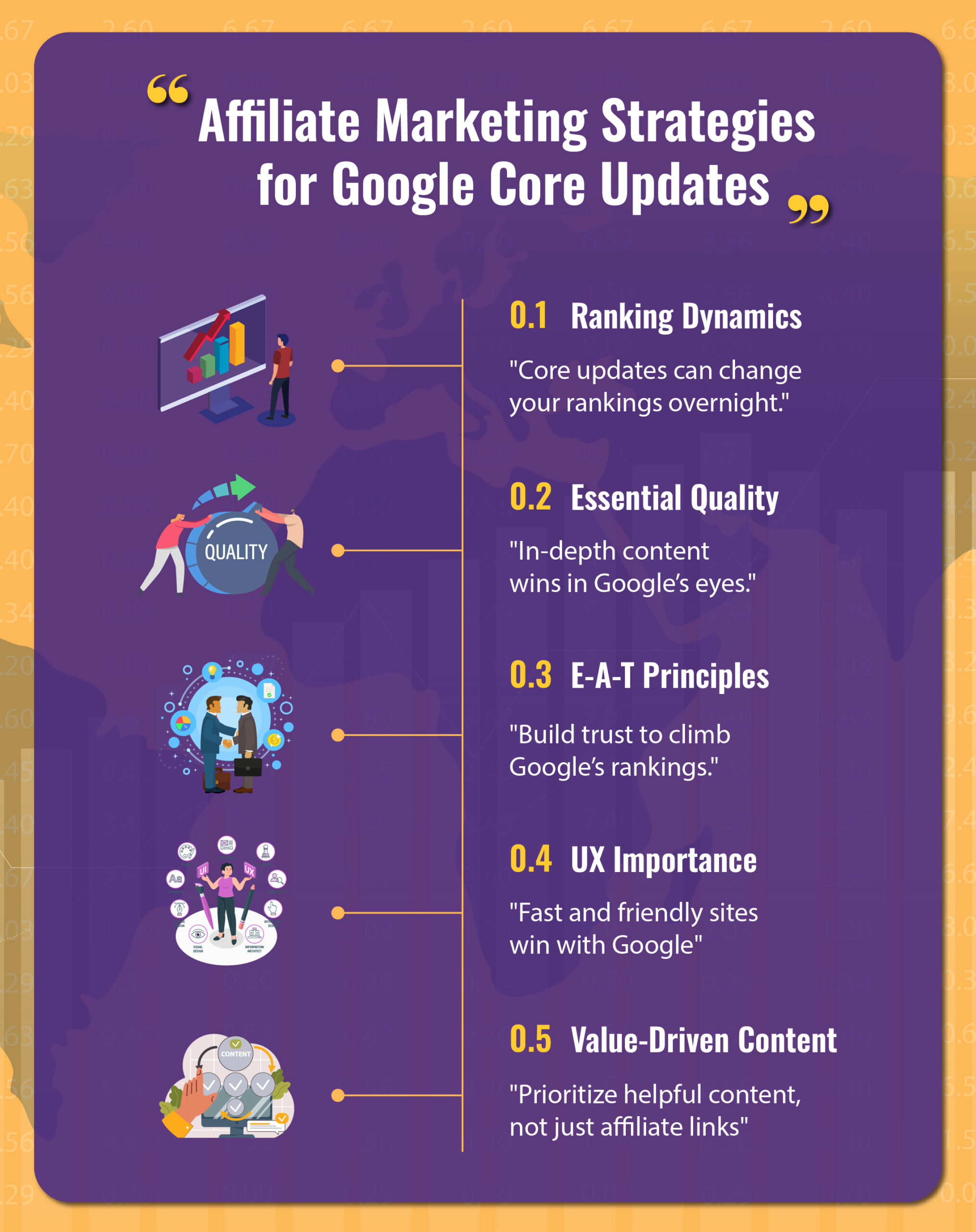[Disclosure: This post may contain affiliate links. If you click on one of these links and make a purchase, we may earn a commission at no extra cost to you. We only recommend products we believe will add value to our readers. For more info read our full Affiliate Disclosure]
If you’re an affiliate marketer, you know that staying on top of trends and updates is the best practice for your success. One of the biggest factors that can shake up your website’s performance is Google’s core updates. These updates happen multiple times a year and can cause serious changes to how your site ranks in search results. But don’t worry—while these updates may seem overwhelming, with the right strategy, you can still rank high and stay ahead of the competition.
In this blog, we’ll break down how Google’s core updates affect affiliate marketers and give you the strategies to stay on track and continue growing your traffic and income.
What Are Google’s Core Updates?
Google’s core updates are major changes to the search engine’s algorithms. These updates affect how Google ranks websites in search results. The goal is to improve the quality of search results by showing users the most relevant, reliable, and high-quality content.
Unlike smaller updates that focus on specific issues, core updates affect the entire search framework and can displace some site rankings. They happen several times a year, and each one brings a new round of changes.
How Google’s Core Updates Affect Affiliate Marketing
Affiliate marketing depends heavily on organic search traffic, so any changes to Google’s algorithm can have a big impact on your site. Here’s how Google’s core updates can affect you:
1. Changes in Rankings
Core updates can cause your website’s rankings to move up or down dramatically. If your site was previously ranking well, you might see it drop in position. On the other hand, if you were struggling to rank, you could see a rise in traffic. This makes it important to track your rankings and make adjustments to your strategy as needed.
2. Quality Content Is More Important Than Ever
Google values high-quality, useful content that answers user questions. If your content is shallow or poorly written, you could see a drop in rankings. On the other hand, websites that offer in-depth, original content are more likely to be rewarded.
3. E-A-T: Establishing Expertise, Authoritativeness, and Trustworthiness
Google places a lot of weight on a site’s E-A-T (Expertise, Authoritativeness, and Trustworthiness), especially in sensitive niches like health, finance, and technology. If you’re promoting affiliate products in these areas, it’s essential to build credibility and demonstrate your expertise. Sites that fail to establish authority may see a hit in rankings.
4. User Experience Still Matters
Google aims to deliver a great user experience. This includes how fast your site loads and how mobile-friendly it is. A slow or unfriendly website can hurt your rankings. Make sure your site is fast, easy to use, and optimized for mobile devices.
5. Focus on Value, Not Just Affiliate Links
While affiliate links are key to your revenue, Google doesn’t want to see a website full of affiliate links with little content to back them up. To do well after a core update, focus on providing real value to your audience through helpful content, and use affiliate links to enhance the user experience, not dominate the page.

How to Stay Ahead After a Google Core Update
Now that you know how Google’s core updates affect affiliate marketing, let’s look at how you can adapt and thrive:
1. Prioritize Content Quality
Focus on producing detailed, helpful, and engaging content that answers users’ questions to create value for your audience. Regularly update older posts to maintain relevance and accuracy, ensuring your site stays fresh and informative. Enhance your content’s appeal by incorporating multimedia elements such as images, videos, and infographics, making it more engaging and visually compelling. To make sure you’re on the right track, check out Google’s official content guidelines for more detailed guidance
2. Optimize User Experience
A fast website improves user engagement and reduces bounce rates, helping boost your rankings. Ensure your site is mobile-friendly, as many users access content on the go. Also, simplify navigation so visitors can easily find what they’re looking for with clear and logical menus.
3. Build Authority and Trust
Referencing credible sources helps build trust with both your audience and Google. Engage with your audience by responding to comments and interacting with users to strengthen your connection. Additionally, leverage social proof by using testimonials, reviews, and success stories to highlight the value of the products you promote.
4. Diversify Your Traffic Sources
Don’t rely solely on organic search traffic. Exploring other channels like social media, email marketing, and paid ads can help you maintain a steady flow of visitors, even if your search rankings fluctuate.
5. Monitor Your Site’s Performance
Use tools like Google Analytics and Google Search Console to track your site’s performance and spot any changes after a core update. This will help you adjust your strategy and stay ahead of any issues.
FAQs
1. What are Google’s core updates?
Core updates are major changes to how Google ranks websites, aiming to show better, more relevant content.
2. How do core updates affect my affiliate website’s rankings?
Core updates can cause your rankings to go up or down based on how well your content matches Google’s standards.
How can I improve my website’s user experience for better rankings?
Make your site fast, mobile-friendly, and easy to navigate to improve user experience and rankings.
What is E-A-T, and why is it important for affiliate marketers?
E-A-T stands for Expertise, Authoritativeness, and Trustworthiness, which helps Google rank your site higher, especially in sensitive topics.
How can I stay ahead after a Google core update?
Focus on quality content, user experience, and trust. You also need to diversify your traffic sources to stay competitive.
Conclusion
Google will keep updating its search algorithm, so you must keep up with the updates, adjust your strategy, and always prioritize value. With the right approach, you can adapt.
Ready to stay ahead of the game? Start by conducting a content audit of your website today and identifying areas for improvement.
Need help? Explore our expert resources and tools to optimize your affiliate marketing strategy!
[Disclosure: This post may contain affiliate links. If you click on one of these links and make a purchase, we may earn a commission at no extra cost to you. We only recommend products we believe will add value to our readers. For more info read our full Affiliate Disclosure]








